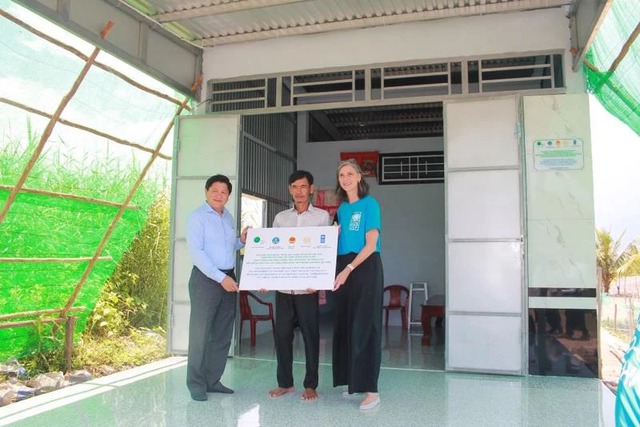UNDP hands over safe houses to needy residents in Ca Mau
VGP - The United Nations Development Program (UNDP), in collaboration with the administration of the southernmost province of Ca Mau, handed over 59 safe houses to residents of Khanh Lam commune in U Minh district on August 15.

Ramla Khalidi, UNDP Resident Representative in Viet Nam (R) at the handover ceremony, Ca Mau Province, August 15, 2024 - Photo: vneconomy
This is part of component 1 of the project on improving the resilience of vulnerable coastal communities to climate change related impacts in Viet Nam (known as GCF project).
Ca Mau province joined the project later than others (January 2024), however, with the efforts of the project management board, local administration, and beneficiary families, the project has successfully achieved its goal of building 425 safe houses.
Speaking at the handover ceremony, Ramla Khalidi, UNDP Resident Representative in Viet Nam, emphasized that the project's completion has turned the dream of a safe house for the poor in coastal areas into a reality. It provides a motivation for the households to focus on developing their livelihoods and escaping poverty, she said.
According to Ramla Khalidi, a house is a valuable asset for individuals and families, therefore, building safe houses is the foundation for enhancing the climate resilience of families living in Viet Nam's coastal areas. UNDP is committed to continuing its support to the government and people of Viet Nam in facing the impacts of climate change, particularly for vulnerable families.
The safe houses built in Ca Mau comply with the safety standards set by the Ministry of Construction. They incorporate additional features for resilience, suited to the landscape and customs of coastal residents.
They are at least 0.5m above the highest water level and have a lifespan of more than 20 years. It costs VND80 million (about US$3,200) to build a house, half of the sum is provided by the project and the remaining comes from the local administration.
The project on improving the resilience of vulnerable coastal communities to climate change related impacts in Viet Nam includes three components, namely providing support for building storm- and flood-resistant houses, mangrove planting and disaster risk data information.
The project was carried out in Nam Dinh, Thanh Hoa, Quang Binh, Thua Thien-Hue, Quang Nam, Quang Ngai and Ca Mau from 2017 to July 2024. The goal of component 1 was to build 4,000 safe houses, benefiting 20,000 poor people who are heavily affected by natural disasters. Up to now, the project has exceeded the set target with 4,966 houses built./.
